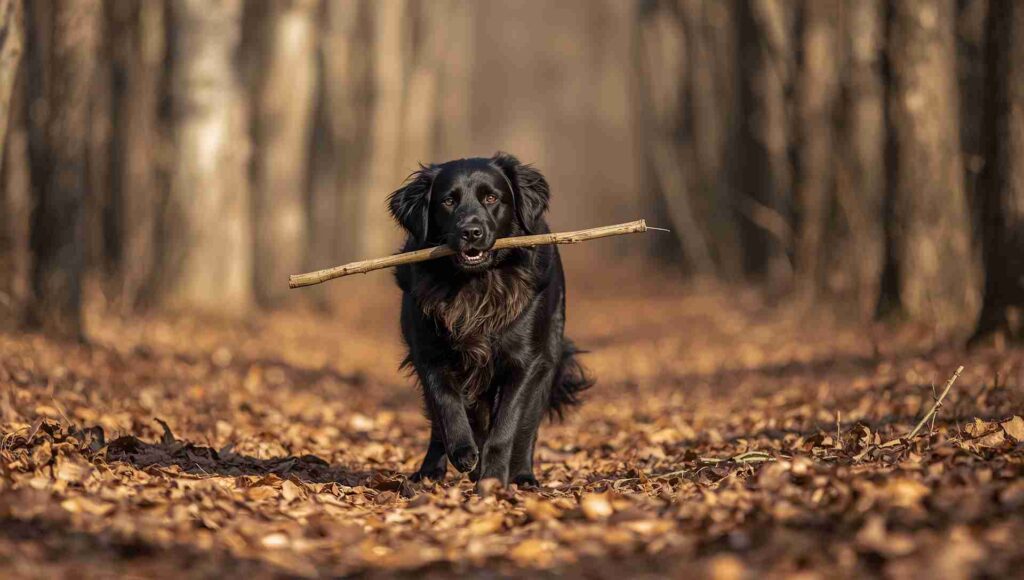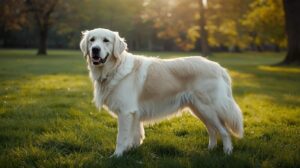Black Golden Retriever: The Complete Owner’s Guide

Introduction to Black Golden Retrievers
The black golden retriever represents one of the most intriguing variations within the golden retriever family. While traditional golden retrievers are beloved for their characteristic golden coats, black golden retrievers challenge conventional breed expectations with their striking dark appearance. These dogs maintain all the wonderful temperament traits that make golden retrievers exceptional family pets while showcasing a unique genetic expression that sets them apart from their lighter-colored relatives.
Understanding black golden retrievers requires examining both their genetic background and their place within the broader golden retriever community. These dogs often spark curiosity and sometimes confusion among dog enthusiasts who expect golden retrievers to display only shades of gold, cream, and light brown.
The Genetics Behind Black Golden Retrievers
Understanding Coat Color Inheritance
Black golden retrievers result from specific genetic combinations that affect coat pigmentation. The black coloration typically emerges when golden retrievers are crossed with other breeds carrying dominant black coat genes, such as Labrador retrievers or flat-coated retrievers. Pure golden retrievers possess recessive genes for coat color, which means black coloration doesn’t naturally occur in purebred golden retriever lines.
The melanin production in these dogs differs significantly from traditional golden retrievers. While golden retrievers produce primarily pheomelanin (responsible for red and yellow pigments), black golden retrievers produce higher levels of eumelanin, which creates darker pigmentation throughout their coat.
Genetic Testing and Verification
Modern genetic testing can help determine the exact heritage of black golden retrievers. DNA analysis reveals whether these dogs are purebred golden retrievers with rare genetic expressions or crossbred dogs displaying mixed heritage characteristics. Most reputable breeders recommend genetic testing to provide accurate information about lineage and potential health considerations.
Physical Characteristics and Appearance
Coat Features and Texture
Black golden retrievers typically maintain the same double-coat structure as traditional golden retrievers. Their outer guard hairs provide weather resistance, while their dense undercoat offers insulation. The texture remains soft and slightly wavy, though some black golden retrievers may display straighter coat patterns depending on their genetic background.
The black coloration can range from deep jet black to softer charcoal tones. Some dogs exhibit subtle color variations with lighter patches on the chest, feet, or facial areas. Seasonal shedding patterns mirror those of traditional golden retrievers, requiring consistent grooming maintenance throughout the year.
Size and Build Specifications
| Characteristic | Male | Female |
|---|---|---|
| Height | 23-24 inches | 21.5-22.5 inches |
| Weight | 65-75 pounds | 55-65 pounds |
| Life Expectancy | 10-12 years | 10-12 years |
| Exercise Needs | 60-90 minutes daily | 60-90 minutes daily |
Distinguishing Features
Black golden retrievers maintain the classic golden retriever head shape with broad skulls, friendly eyes, and pendant ears. Their tails retain the characteristic feathering, though the dark coloration creates a dramatically different visual appearance. Eye color typically ranges from dark brown to amber, complementing their dark coat beautifully.
Temperament and Personality Traits
Core Behavioral Characteristics
Black golden retrievers inherit the same gentle, intelligent, and friendly temperament that makes golden retrievers exceptional family companions. These dogs display high levels of trainability, eagerness to please, and natural affinity for human interaction. Their social nature makes them excellent with children, other pets, and strangers when properly socialized.
As one experienced dog trainer noted, “Black golden retrievers possess all the wonderful personality traits of traditional goldens, just wrapped in a different colored package. Their intelligence and willingness to work make them outstanding companions for active families.”
Energy Levels and Activity Requirements
These dogs require substantial daily exercise to maintain physical and mental health. Swimming, retrieving games, hiking, and structured play sessions help channel their natural energy constructively. Without adequate exercise, black golden retrievers may develop destructive behaviors or excessive barking patterns.
Mental stimulation proves equally important for these intelligent dogs. Puzzle toys, training sessions, and interactive games help prevent boredom and strengthen the human-dog bond. Their working dog heritage means they thrive when given purposeful activities that engage their natural instincts.
Health Considerations and Care Requirements
Common Health Issues
Black golden retrievers face similar health challenges as traditional golden retrievers. Hip dysplasia, elbow dysplasia, and certain eye conditions appear with comparable frequency across both color variations. Regular veterinary checkups help identify potential issues early and maintain optimal health throughout their lifetime.
Cancer rates in golden retrievers remain a significant concern, with approximately 60% of golden retrievers developing some form of cancer during their lifetime. This statistic applies equally to black golden retrievers, making preventive care and early detection crucial for long-term health management.
Nutritional Requirements
High-quality nutrition supports healthy coat development, joint function, and overall vitality in black golden retrievers. Premium dog foods containing balanced proteins, healthy fats, and essential vitamins promote optimal health outcomes. Portion control helps prevent obesity, which can exacerbate joint problems and reduce life expectancy.
Training and Socialization
Early Development Strategies
Black golden retrievers respond exceptionally well to positive reinforcement training methods. Their natural intelligence and desire to please make them highly trainable from an early age. Consistent training schedules, clear commands, and reward-based systems produce excellent results with these dogs.
Socialization during the critical period between 3-14 weeks of age helps ensure well-adjusted adult behavior. Exposure to various people, animals, environments, and experiences creates confident, well-rounded dogs capable of adapting to different situations throughout their lives.
Advanced Training Opportunities
Many black golden retrievers excel in competitive activities such as agility, obedience trials, and therapy work. Their athletic abilities and trainable nature make them suitable candidates for various dog sports and service roles. Some owners pursue specialized training for hunting, search and rescue, or assistance dog work.
Grooming and Maintenance
Daily Care Routines
Black golden retrievers require regular brushing to manage their double coat and prevent matting. Daily brushing during shedding seasons helps control loose hair and maintains coat health. Professional grooming every 6-8 weeks keeps their appearance neat and addresses specific grooming needs.
Nail trimming, ear cleaning, and dental care form essential components of their maintenance routine. Regular attention to these areas prevents common problems and maintains overall health and comfort.
Seasonal Considerations
Seasonal coat changes require adjusted grooming routines throughout the year. Spring and fall shedding periods demand increased brushing frequency to manage excessive hair loss. Summer grooming may include coat trimming to help with temperature regulation, while winter care focuses on protecting paw pads and maintaining coat condition.
Finding and Choosing Black Golden Retrievers

Breeder Selection Criteria
Locating reputable breeders specializing in black golden retrievers requires careful research and evaluation. Responsible breeders provide health clearances, genetic testing results, and detailed information about parent dogs. They welcome questions about their breeding practices and allow potential owners to meet parent dogs when possible.
Avoid puppy mills and backyard breeders who cannot provide adequate health documentation or proper socialization for their puppies. Quality breeders invest in health testing, proper nutrition, and early socialization experiences that benefit puppies throughout their lives.
Adoption Alternatives
Rescue organizations occasionally have black golden retrievers available for adoption. These dogs may be adult animals seeking new homes due to owner surrender or abandonment situations. Adoption provides an opportunity to give deserving dogs second chances while supporting rescue efforts.
For more detailed information about golden retriever adoption and care, visit Golden Retriever Guides for comprehensive resources and expert advice.
Living with Black Golden Retrievers
Home Environment Considerations
Black golden retrievers adapt well to various living situations but thrive in homes with adequate space for exercise and play. Secure fencing provides safe outdoor access while preventing wandering behaviors. These dogs prefer being close to their families and may develop separation anxiety if left alone for extended periods.
Indoor living arrangements should accommodate their size and activity levels. Comfortable sleeping areas, appropriate toys, and designated feeding spaces help create structured environments that support good behavior patterns.
Family Integration
These dogs integrate beautifully into family life, forming strong bonds with all family members. Their gentle nature makes them excellent with children, though supervision remains important during interactions with very young children due to their size and enthusiasm.
According to the American Kennel Club, “Golden retrievers consistently rank among the top family dog breeds due to their reliable temperaments and adaptability to family life.” This assessment applies equally to black golden retrievers, who maintain these same valuable characteristics.
Cost Considerations and Budgeting
Initial Investment Requirements
Acquiring a black golden retriever involves significant initial costs including purchase price, initial veterinary care, supplies, and training expenses. Quality puppies from reputable breeders typically cost between $1,500-$3,000, depending on lineage and breeder reputation.
Essential supplies include high-quality food, bedding, toys, grooming tools, and safety equipment. Initial veterinary expenses cover vaccinations, spaying or neutering, and baseline health evaluations.
Ongoing Expenses
Monthly costs for black golden retrievers include food, routine veterinary care, grooming, and replacement supplies. Annual expenses typically range from $1,200-$2,000 for healthy adult dogs, though emergency veterinary care can significantly increase costs.
Pet insurance may help manage unexpected veterinary expenses while ensuring access to quality medical care throughout their lifetime. Many policies cover accidents, illnesses, and routine preventive care depending on coverage levels selected.
The Future of Black Golden Retrievers
Breeding Trends and Recognition
Interest in black golden retrievers continues growing among dog enthusiasts seeking unique variations of beloved breeds. However, breed registries and kennel clubs maintain strict standards regarding acceptable colors for purebred golden retrievers.
Some breeders focus specifically on developing black golden retriever lines while maintaining health and temperament standards. These efforts require careful breeding programs that prioritize genetic diversity and health testing to produce quality dogs.
For additional information about golden retriever genetics and breeding practices, consult resources from the American Kennel Club for authoritative guidance on breed standards and health considerations.
Conclusion
Black golden retrievers represent fascinating examples of genetic variation within the golden retriever family. These remarkable dogs combine the beloved temperament and characteristics of traditional golden retrievers with striking black coat coloration that sets them apart from their golden-colored relatives. While they may not meet traditional breed standards for purebred golden retrievers, they offer wonderful companionship opportunities for families seeking intelligent, loyal, and beautiful dogs.
Understanding their genetic background, care requirements, and unique characteristics helps potential owners make informed decisions about welcoming these special dogs into their families. Whether acquired from specialized breeders or rescue organizations, black golden retrievers provide years of faithful companionship when properly cared for and trained.
Their growing popularity reflects increasing appreciation for genetic diversity within established breeds, though potential owners should always prioritize health, temperament, and responsible breeding practices over appearance alone. With proper care, training, and attention to their specific needs, black golden retrievers make exceptional family companions that bring joy and loyalty to their human families for many years.
As interest in these unique dogs continues to evolve, one question remains: will black golden retrievers eventually gain recognition as a distinct variety within the golden retriever breed, or will they continue to exist as beloved crossbred companions that capture hearts with their striking appearance and wonderful personalities?






